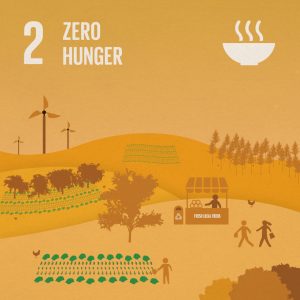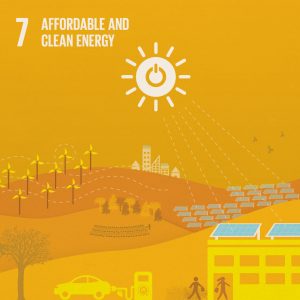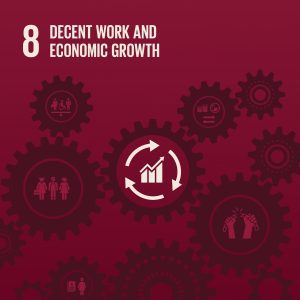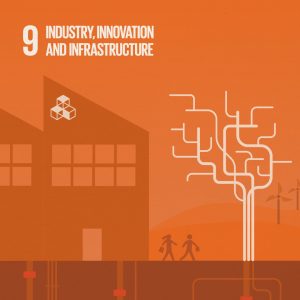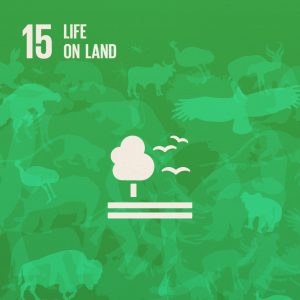“The Stone Age did not end because humans ran out of stones. It ended because it was time for a re-think about how we live.” ~William McDonough
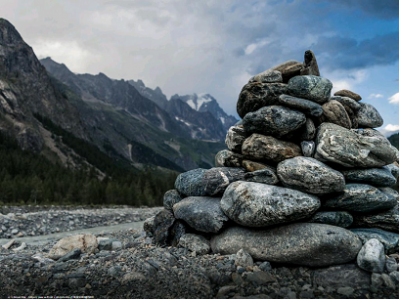
Photo credit: Haiku Deck
This month in our exploration of the 17 Sustainable Development Goals, created by 193 countries under the auspices of the United Nations, we settle on Goal 9: Build resilient infrastructure, promote inclusive and sustainable industrialization, and foster innovation.
This column focuses on the innovation piece, which makes resilient infrastructure, inclusive and sustainable industrialization, and any kind of progress possible.
Innovation. Innovation requires change. The rub is that, for the most part, we as a species don’t like change.
Of course, there are innovations that society has readily accepted: air conditioning, the Internet, cell phones, Tik Tok.
But the fact remains, humans will resist innovations and adaptations that seem like no-brainers, like wearing face masks to protect ourselves and others from a life-threatening virus during a pandemic. And wearing masks was recommended and practiced 100 years ago, so that adaptation isn’t even new, just recycled. People can become threatened when their core beliefs and established ways of thinking and doing things are challenged, even when the status quo is terrible.
Ray Anderson, the late founder and chairman of Interface, Inc – one of my favorite business leaders and companies – explains why: “…conventional wisdom and the status quo are powerful sedatives. Like opiates, they dim our vision and cloud our mind.”
In a complacent state, the status quo perpetuates and exacerbates crisis after crisis even as the need for change grows more dire by the day. Not convinced? Watch the documentary David Attenborough: A Life on Our Planet, the 93-year-old Attenborough’s witness statement on the state of the planet and humanity. It is at once brilliant, troubling, and inspiring. And there are many crises that this documentary does not address.
To embrace the innovations called for by Attenborough and many others, we need clear vision and clear minds, a sense of adventure, openness to possibility, a willingness to question our basic assumptions and see, think, and act differently.
So three cheers to innovators, people with the courage, creativity, and clarity of mind to generate new realities, who perceive flaws in conventional wisdom and the status quo and offer us a way forward.
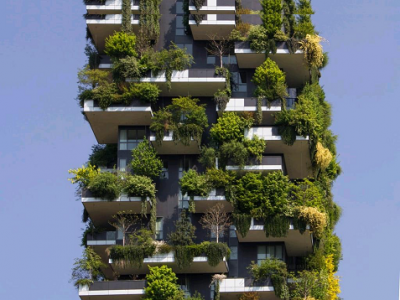
Photo credit: Haiku Deck
All around us, innovators are providing life-changing, crisis-resolving innovations that are on hand and already in use on a small scale. Learning about these ideas is perhaps the most exciting thing about working in the sustainability field. It’s also the most frustrating thing about sustainability work. Because they are right in front of us, yet so many remain largely unseen, underappreciated, ignored, or actively resisted. Aaaargh! This is so frustrating!
Here are a few examples of world-changing innovations, some of which have been mentioned in previous columns—more than once. Beyond these, there are innovators and innovations that address every issue you can think of, ripe for the picking. What will it take to get us to move, to leave the familiarity and (relative) comfort, for some of us anyway, of the way things are?
- On business: Ray Anderson (1934-2011), founder and chairman of Interface, Inc., shows what is possible in business and industry.
- Watch Anderson’s TED talk, read his book Business Lessons From a Radical Industrialist, check out the Interface website on their sustainability commitments, initiatives, and accomplishments.
- As Ray put it in his book: “We have turned on its head the myth that you could do well in business or do good, but not both…. And if we can do it, anybody can. And if anybody can, everybody can.”
- On design: William McDonough, architect and designer, proves that sustainable design enables environmental regeneration and drives economic development.
- Watch McDonough’s TED talk on Cradle to Cradle design.
- Among many extraordinary accomplishments, McDonough + Partners created the Adam Joseph Lewis Center for Environmental Studies at Oberlin College, a carbon-positive and net-zero energy verified building.
- He offers one of my favorite definitions of sustainability: “Our goal is a delightfully diverse, safe, healthy, and just world, with clean air, water, soil, and power – economically, equitably, ecologically and elegantly enjoyed.”
- On economics: Kate Raworth, self-described “renegade economist.”
- Watch Raworth’s TED talk about designing economies for human thriving rather than blind growth.
- Her paradigm-shifting book Doughnut Economics is, in my opinion, one of the most important books of the 21st century.
- She explains seven ways to think like a 21st-century economist to craft an economy that creates “a safe and just place for all of humanity within the means of our life-giving planet.”
- On renewing our democracy:
- Last month I wrote about the American Academy of Arts & Sciences Commission on the Practice of Democratic Citizenship publication Our Common Purpose: Reinventing American Democracy for the 21st Century. Here are a few of the innovations they recommend.
- Enlarge the House of Representatives; introduce ranked-choice voting; change election day to Veterans Day and make voting in federal elections a requirement of citizenship; give people more choices about when and where they vote; enact federal legislation that requires redistricting to be done in each state by bipartisan citizen commissions; federal legislation to create 18-year terms for Supreme Court justices.
- Last month I wrote about the American Academy of Arts & Sciences Commission on the Practice of Democratic Citizenship publication Our Common Purpose: Reinventing American Democracy for the 21st Century. Here are a few of the innovations they recommend.
- On invigorating the skills of citizen engagement to strengthen democracy and address climate change:
- Brandeis University’s Carmen Sirianni this year wrote “The Civics of a Green New Deal: Towards Policy Design for Community Empowerment and Public Participation in an Age of Climate Change.” From the forward, by Peter Levine, Tufts College: “Citizens need opportunities to address crucial problems together. They need the skills, encouragement, and support to be part of improving their own communities. They must work together across demographic and partisan divides and with various kinds of institutions and professions. Such opportunities generate support for democratic political systems.” Sirianni explains what this could look like.
- On climate change:
- Project Drawdown conducted research that uncovered 100 existing solutions to draw down greenhouse gas concentrations in the atmosphere, which must be done if we are to have a stable and livable climate. These social, environmental, and technical innovations are already in practice. All we have to do is take them to scale and, in the process, create millions of jobs.
- On regenerative agriculture:
- Inspired by the practices of Native Americans, Allan Savory, Robert Rodale, and others developed this idea. It is one of the top 100 solutions to climate change, according to Project Drawdown. It is mentioned in the book The New Grand Strategy as one of “three vast pools of pent-up demand” that can drive economic flourishing in the 21st century.
- Check out Regeneration International, whose mission is “To promote, facilitate and accelerate the global transition to regenerative food, farming, and land management for the purpose of restoring climate stability, ending world hunger and rebuilding deteriorated social, ecological and economic systems.”
- Watch the Netflix documentary “Kiss the Ground,” narrated by Woody Harrelson, to learn more.
- On renewable energy:
- Investigate Amory Lovins and the Rocky Mountain Institute (RMI). Lovins has been preaching the gospel of renewable energy for decades. “Rocky Mountain Institute’s mission is to transform global energy use to create a clean, prosperous, and secure low-carbon future.”
- Watch Lovins’ 2013 TED talk: “A 40-year plan for energy,” an update of TED talks he gave in 2007 and 2012.
I heard blind mountain climber Erik Weihenmayer give a speech to high school students several years ago. He had recently summited Mount Everest and was telling the students about it and what it takes to accomplish anything in life. I will never forget what he said: “The human mind loves comfort, familiarity, and certainty. But you will summit nothing in your life if you do not subject yourself to discomfort, unfamiliarity, and uncertainty.”
Disturbance that unsettles our certainty, our complacency in the status quo, is a good thing. My favorite writing on this subject is by Margaret Wheatley in a piece titled “Disturb Me, Please!”
One way or another, disturbance will move us away from the way we do things now. If disturbance is self-induced, as Weihenmayer and Wheatley implore, we open ourselves to exciting new worlds of possibility and still have time to maneuver to create the future we want.
But the time for us to boldly change and innovate is now. We are already experiencing unprecedented economic, environmental, social, political, and public health upheavals on a global scale because we cling to ways that do so much damage to people and all life on Earth. Keep this up, and by the time disturbances get so nightmarish we can’t stand them, it will be too late.
It’s up to us. As W. Edwards Deming put it, “It is not necessary to change. Survival is not mandatory.”
Learn about the SDGs & AU and our contributions related to this post.

